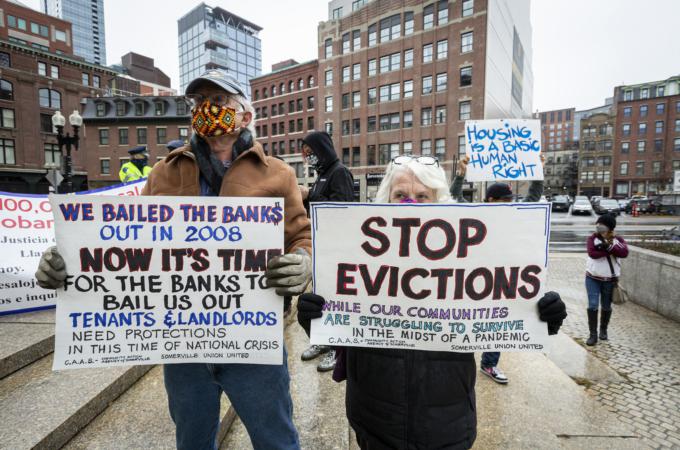Catholic Charities sees increased need as evictions resume
BRAINTREE -- At the onset of the coronavirus pandemic, as businesses and their employees suffered the economic impact of the shutdown, the ability to pay for housing was a major concern for workers. Fears of eviction or foreclosure were abated by legislation that froze rents for months at a time, but Catholic Charities has seen the problem return in full force since the state's moratorium came to an end on Oct. 17.
In early October, the Metropolitan Area Planning Council released a study on the impact of the coronavirus pandemic on housing. Its findings estimated that 45,000 renter households and 35,000 owner households would have trouble covering their housing costs and basic needs during the month of October. They also estimated that 60,000 Massachusetts renter households fear imminent eviction.
Catholic Charities of the Archdiocese of Boston has seen firsthand the impact of the economic crisis caused by the coronavirus pandemic -- a crisis that they say has been further exacerbated since the moratorium ended.
Manuel Pires is the program manager for basic needs at Catholic Charities, supervising Middlesex and Suffolk County.
"What we do, in general, is try to help people from crisis to stability to self-sustainability. Our infrastructure is all ready to deal with any crisis that comes our way," Pires said in a Nov. 4 interview.
He said that since the pandemic started, the overall number of people calling Catholic Charities for assistance has been "through the roof."
"The numbers have increased tremendously. Our hotline is getting swamped," he said.
Pires said that in the past two months they have screened about 200 people to be assisted. That is about how many people they would assist in a year under normal circumstances.
He said that the pandemic "maximized the crises we were already dealing with."
"It has maximized in terms of people in fear and not knowing what to do," Pires said.
Catholic Charities can help people in danger of eviction by teaching them about their rights, mediating negotiations with landlords, and helping identify and apply for types of government assistance they are eligible for.
Larry Mayes, vice president of programs at Catholic Charities of Boston, said Pires' work depends on public-private partnership, with funding coming from the city or state government. In general, Pires and his team assess clients' needs, help clients apply for funds they are eligible for, and make sure those public resources are used responsibly.
Regarding evictions, Mayes said, "the scale of the problem is enormous, so it takes a larger governmental response."
The Massachusetts Catholic Conference has already weighed in on the issue of housing bills twice over the course of the pandemic, voicing support for the moratorium and its extension.
On Oct. 11, a week before the moratorium was to set to expire, the Massachusetts Catholic Conference sent a letter to Senate President Karen Spilka and Speaker of the House Robert DeLeo, urging them to pass House Bill 5018 and Senate Bill 2918, "An Act to guarantee housing stability during the COVID-19 emergency and recovery." These identical bills would extend the moratorium until one year after the state of emergency ends.
The bills are still in the legislature, but on Oct. 12, Gov. Charlie Baker announced a $171 million plan to prevent evictions in ways that do not require legislation. This plan combines state-available money in the existing funds of the state budget with some money from the federal CARES Act.
Jim Driscoll, executive director of the Massachusetts Catholic Conference, said he thinks the governor's plan slowed the momentum of the two bills.
"In my opinion, with this financial support, the two bills are not a priority in the legislature at this time," Driscoll said.
Pires said that if someone has been notified that they need to leave their home, the first important thing is to not ignore the notice. They should acknowledge it, and if they do not understand what it says, they need to learn about their rights as a tenant -- something Catholic Charities can help them do. They can try to negotiate with their landlord, and if they are unable to do that, Catholic Charities can help by providing mediation. Catholic Charities can also help find resources for both tenants and landlords.
Pires emphasized that eviction is a process, and not everyone knows the steps involved. So when a tenant receives an eviction notice telling them to leave in a certain number of days, they feel they have to move because they cannot pay.
"If they're able to get in touch with our hotline, or even with another agency, just to make sure they get a little bit of education, that's important," Pires said.
Catholic Charities of the Archdiocese of Boston's basic needs services can be contacted at their hotline, 617-506-6628, or email Basic_needs@ccab.org.



















